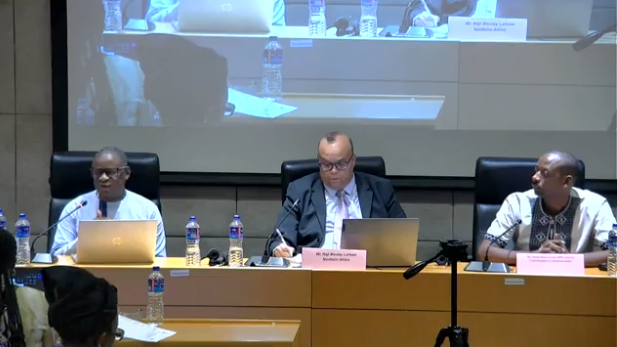The session on “State Reporting and Shadow Reporting,” moderated by Corlette Letlojane, highlighted the obligations of states to submit reports as mandated by international and regional human rights bodies. Letlojane emphasized that the responsibility to report is not limited to entities with observer status; non-state actors, particularly civil society organizations (CSOs), also play a crucial role in this process.
Key Contributions
Dr. Mohammed Djalel Benabdoun, ACHPR Focal Point on State Reporting, addressed the periodic reporting process as outlined in Article 62 of the African Charter. He noted that member states are required to submit human rights reports to the African Commission every two years, a requirement that extends beyond the African context to include similar reports to the United Nations. Benabdoun described these submissions as legal obligations for all states that have ratified the Charter, highlighting their importance in identifying human rights gaps and developing strategies for improvement. He pointed out that many states fail to submit their reports on time or at all, leading to insufficient compliance levels. He stressed the pivotal role of CSOs in holding governments accountable and advocating for timely submissions. CSOs are encouraged to engage with states during the drafting process and can independently submit shadow reports to the Commission. Additionally, he noted that NGOs could apply for observer status, which would enhance their influence in the Commission’s deliberations. Benabdoun advocated for collaborative reporting efforts among NGOs to strengthen the legitimacy and impact of their submissions, as well as the vital role of NGOs and CSOs in monitoring the implementation of the Commission’s recommendations.
Samuel Ndasi, former Legal Assistant at the African Commission on Human and Peoples’ Rights, elaborated on the significance of shadow reports. He emphasized that NGOs are crucial in complementing state reports, particularly given the often incomplete or inaccurate accounts provided by states. Shadow reports present a more accurate and detailed picture of the human rights situation on the ground, highlighting issues that may be overlooked in state submissions. Ndasi outlined best practices for developing shadow reports, stating that they provide the African Commission with concrete recommendations to address gaps in state reporting. He stressed that without shadow reports, the Commission may lack sufficient information to formulate effective recommendations. He urged participants to familiarize themselves with the Commission’s guidelines on shadow reporting and collaborate with other NGOs instead of working in isolation.
Ndasi also discussed challenges NGOs encounter in creating shadow reports, citing issues such as irregularity in state reporting and difficulties accessing official data and statistics. He noted that delays in publishing concluding observations and recommendations by the African Commission can impede follow-up and advocacy efforts by CSOs.
Participants’ Interventions
Participants raised critical issues related to state reporting:
- A participant from Cameroon expressed concern that many individuals are afraid to engage in shadow reporting due to a lack of understanding of the process. She suggested allowing CSOs to submit parallel reports when states fail to report, ensuring that critical human rights issues are highlighted.
- From Nigeria, a participant inquired about strategies for reporting human rights violations while minimizing risks of government backlash, reflecting concerns shared by many activists facing repercussions for their advocacy efforts.
- A participant from Uganda raised concerns about states deliberately violating their reporting obligations while infringing on citizens’ rights, asking what mechanisms exist to address such violations and hold states accountable.
- Another participant from Cameroon highlighted challenges posed by a restrictive regime, noting difficulties obtaining information on state reporting processes and suggesting that political interests compromise the credibility of the National Human Rights Commission.
- A participant from The Gambia pointed out numerous violations reported in media outlets, advocating for thorough investigations into these reports by the Commission to ensure they serve as credible evidence for action. He questioned the effectiveness of advocacy when punitive measures are not enforced.
- A Libyan participant residing in the UK discussed ongoing human rights violations in Libya, stating that the country fails to adhere to its reporting obligations. She cited 238 documented cases of human rights abuses unaddressed by the African Commission and asked whether findings from the Addis Ababa Road Map would be shared with broader communities.
- Lastly, another participant from Nigeria asked if parallel reports could be submitted alongside state reports and how timeliness and publication of these reports are managed by the Commission.
The session delved into the critical importance of both state reporting and shadow reporting in promoting accountability for human rights practices across Africa. The discussions highlighted significant challenges faced by both states and civil society organizations in fulfilling their reporting obligations. The active engagement of CSOs is essential not only for complementing state submissions but also for ensuring that human rights issues are adequately addressed within international frameworks. The call for collaboration among NGOs was evident as participants recognized its potential to enhance advocacy efforts and improve compliance with human rights standards across member states.


